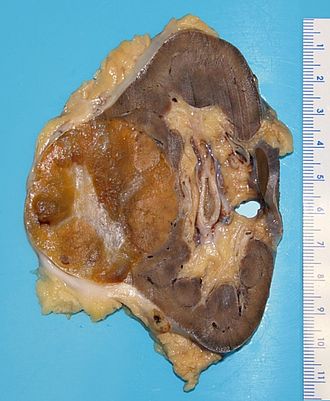Difference between revisions of "Gross pathology"
Jump to navigation
Jump to search

| (3 intermediate revisions by the same user not shown) | |||
| Line 112: | Line 112: | ||
|- | |- | ||
| [[Lower anterior resection for cancer]] | | [[Lower anterior resection for cancer]] | ||
| | |||
|- | |||
| [[Abdominoperineal resection grossing]] | |||
| | | | ||
|} | |} | ||
| Line 137: | Line 140: | ||
| [[Vulvectomy]] | | [[Vulvectomy]] | ||
| | | | ||
|} | |||
===Thoracic=== | |||
{| class="wikitable sortable" | |||
! Specimen | |||
! Comments | |||
|- | |||
|[[Lung lobectomy grossing]] | |||
| | |||
|} | |} | ||
| Line 153: | Line 165: | ||
==External links== | ==External links== | ||
*[http://www.artandmedicine.com/Index.html Old (black & white) gross pathology (artandmedicine.com)]. | *[http://www.artandmedicine.com/Index.html Old (black & white) gross pathology (artandmedicine.com)]. | ||
*[ | *[https://www.rcpa.edu.au/Manuals/Macroscopic-Cut-Up-Manual Cut-up manual from the RCPA (rcpa.edu.au)]. | ||
*[http://www.qmul.ac.uk/bartspathology/specimens/index.html Barts Pathology Museum (qmul.ac.uk)]. | *[http://www.qmul.ac.uk/bartspathology/specimens/index.html Barts Pathology Museum (qmul.ac.uk)]. | ||
*[http://pathinfo.wikia.com/wiki/Specimen_Grossing_Manual Grossing Manual - Pathology Resident Wiki (wikia.com)]. | *[http://pathinfo.wikia.com/wiki/Specimen_Grossing_Manual Grossing Manual - Pathology Resident Wiki (wikia.com)]. | ||
Latest revision as of 20:00, 14 January 2025

A kidney tumour (renal oncocytoma) at the time of grossing.
Gross pathology, also simply gross, refers to the macroscopic pathology, and the macroscopic assessment of pathology specimens. It may include preparation of tissue for a microscopic examination. It is an essential part of pathologic assessments.
The process of cutting up specimens is known as grossing (North American term), cut-up or macroscopic cut-up (Australian term).
Specimen opening
- Usually referred to simply as opening.
- May go by the term freshing.
- The first part of a gross pathologic assessment.
Components
- Orient the specimen.
- Paint with ink - if applicable.
- A good general rule is: ink before you think.
- Cut open for fixation - if not immediately blocked.
- +/-Weigh.
- +/-Insert paper towels in the cuts (book marking) for fixation.
Gross only
Gross only specimens are examined only at the grossing bench; no microscopy is done. Which specimens are considered "gross only" typically depends on institutional policy.[1]
Common gross only specimens
- Teeth.
- Foreign bodies.
- Femoral head with osteoarthritis - no fracture & no history of cancer.
- Calcific aortic stenosis.
How to gross
Principles of grossing
Main article: Principles of grossing
This article is discusses generalities in grossing.
Dermatopathology
| Specimen | Comments |
|---|---|
| Abdominal pannus | often gross only |
Cardiovascular
| Specimen | Comments |
|---|---|
| Aortic valve | may be gross only |
| Mitral valve | may be gross only |
Orthopedic
| Specimen | Comments |
|---|---|
| Femoral head | may be gross only |
| Knee replacement | Soft tissue pathology |
Genitourinary
| Specimen | Comments |
|---|---|
| Cystoprostatectomy | indication: urothelial carcinoma |
| Orchiectomy | |
| Partial cystectomy | indication: urachal carcinoma |
| Partial nephrectomy | indication: renal cell carcinoma |
| Penectomy | |
| Prostate biopsy | |
| Prostate chips | indication: BPH |
| Radical cystectomy | |
| Radical prostatectomy | |
| Total nephrectomy for tumour | |
| Nephroureterectomy | indication: urothelial carcinoma |
Gastrointestinal
| Specimen | Comments |
|---|---|
| Partial colectomy for diverticular disease | |
| Lower anterior resection for cancer | |
| Abdominoperineal resection grossing |
Gynecologic
Thoracic
| Specimen | Comments |
|---|---|
| Lung lobectomy grossing |
Gross pathology spot diagnoses
Main article: Gross pathology spot diagnoses
This is a long list of things that can be identified with a reasonable certainty on gross.
See also
- Basics.
- EIT.
- Tissue loss.
References
- ↑ Zarbo, RJ.; Nakhleh, RE. (Feb 1999). "Surgical pathology specimens for gross examination only and exempt from submission: a College of American Pathologists Q-Probes study of current policies in 413 institutions.". Arch Pathol Lab Med 123 (2): 133-9. doi:10.1043/0003-9985(1999)1230133:SPSFGE2.0.CO;2. PMID 10050786.